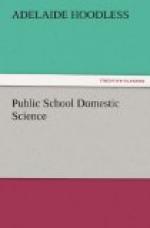“Too much attention cannot be given by parents to the diet of school children, or by teachers to the diet of pupils under their care in boarding schools and colleges. The average age of school children is from six to sixteen years. During this time both mind and body are undergoing development. Throughout school period the growth of the body is continued until almost completed. There are unusual demands, therefore, upon the functions of absorption and assimilation. The food must be abundant, and of the character to furnish new tissue, and to yield energy in the form of heat and muscular activity. The food should also contain salts of lime to meet the requirements of formation of the bones and teeth. Many children acquire habits of dislike for certain articles of food, which become so fixed in later life that they find it very inconvenient, especially when placed in circumstances, as in travelling, where one cannot always obtain the accustomed diet; it therefore is unwise to cultivate such habits, which are often a serious obstacle to normal development.
“A physician is often baffled in the treatment of a severe disease by the vitiated taste of the patient. Many cases of anaemia and chlorosis, which are so commonly seen in young girls, are directly traceable to a faulty diet. It should be the imperative duty of all teachers to consider the responsibility of rightly developing the physical constitutions of those entrusted to their care. They should remember that the mind keeps on developing long after the body, and that the period under discussion is one in which the constitution of the individual is established for the remainder of life. At this stage success in digestion and assimilation is of greater importance than success in mental attainments.” (Thompson.)
An important consideration in school diet is to avoid monotony, which becomes so common from economic reasons, or more often from carelessness. It is so much easier to yield to routine and force of habit than to study the question. The hours for study and for meals should be so regulated that sufficient time will be allowed before each meal for children to wash and prepare themselves comfortably without going to the table excited by hurry, and they should be required to remain at the table for a fixed time, and not allowed to hastily swallow their food in order to complete an unfinished task or game. An interval of at least half an hour should intervene after meals before any mental exertion is required. Constant nibbling at food between meals should be forbidden; it destroys the appetite, increases the saliva, and interferes with gastric digestion.




